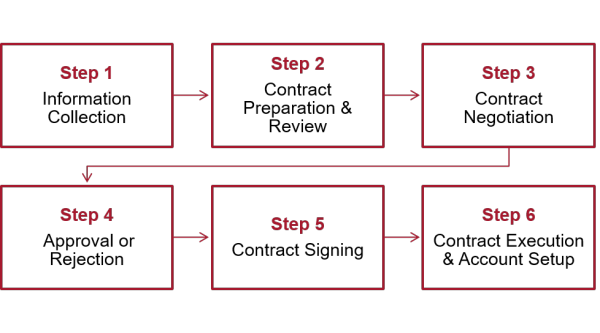On this page:
Research Services includes a Research Contracts Coordinator, Research Contracts Officers and the Legal Counsel that will review awards and, if necessary, negotiate with the sponsor to ensure the terms and conditions are acceptable to the university. They will consult with the principal investigator and the appropriate university administrators as-needed.
Process of Agreement Execution

Step 1: Information Collection
Please contact Research Services (rescontract@sfu.ca for contracts, ors@sfu.ca for grant agreements or if unsure) as soon as you become aware that an agreement is required to formalize a relationship with a sponsor. Research Services will work with you to execute an agreement.
Please provide Research Services with a complete package, including:
- an approved Kuali proposal (this replaces the previously required SFU signature sheet)
- Sponsor contact particulars
- Notice of Award, or funding decision if any
- If applicable: Prime (original) agreement, including all terms & conditions, either on the back of the document or as an attachment
- If applicable: All referenced exhibits, attachments, addendums or if this is an amendment, the original contract
If the contract results in research funding, or you are working on an amendment to an existing contract, you will need to make sure all necessary research compliance certifications are in order before you can access funds. To help save time try to prepare the following approvals and plans while your contract is under negotiation:
- Research Ethics Approval
- Animal Care Approval
- Biohazard Approval
- Conflict of Interest Declaration and Management Plan
- Contract Approval Memorandum (CAM)
- Dean’s Guarantee
- Matching requirements
- Indemnity/Guarantee (SFU Indemnity Approval Policy AD 3.14)
Step 2: Contract Preparation & Review
Within Research Services a Research Contracts Officer or Legal Counsel will liaise with you, the sponsor and any other party involved to determine what kind of sponsored research agreement is required.
- Research Services prefers to use its standard Sponsored Research Agreement as the model for most research agreements. If you are in direct communication with the sponsor before Research Services is involved, please offer the standard terms or instruct Research Services to do so on your behalf.
- Sometimes a sponsor will propose its own research agreement as the starting point. In this case, please send us the sponsor’s proposed agreement as soon as you receive it or ask them to send it directly to Research Services.
If the agreement can be accepted, Research Services will review the agreement with you and then approve the award for account setup.
If there are terms and conditions in the agreement that are not acceptable to SFU, Research Services will contact the sponsor to negotiate any required changes. Upon agreement of mutually acceptable terms and conditions, Research Services will send a copy of the agreement to you for review and approval of terms. After receiving written acceptance from you, Research Services will then approve the award (Step 4).
However, if initial discussions with the sponsor demonstrate that non-standard provisions are being requested and additional discussions will be required, Research Services commences a process to negotiate terms in the agreement (Step 3).
Step 3: Contract Negotiation
If non-standard terms are involved, Research Services will negotiate with the sponsor. Research Services will notify you immediately if the agreement contains terms that the university cannot accept. Depending on the nature of the agreement, Research Accounting, Risk Management, and/or other compliance services may become involved.
Step 4: Approval or Rejection
Research Services finalizes negotiations and, in conjunction with the Director of Research Services, recommends contract for execution or rejection.
Step 5: Contract Signing
Research Services provides Contract Approval Memorandum (CAM) to you that will have to be returned to Research Services with the signatures of Chair/Director, and Dean. The CAM informs your Department about your activities so they are aware of your resource, space and financial commitments including nonpayment guarantee. Your Department will also review compliance with your Collective Agreement and other applicable SFU policies.
To save time before you can access your funding, please inform your Chair and the Dean, in advance and in writing, if and when your new project has implications such as:
- Activities that result in the rescheduling, delegation or non-fulfillment of any work obligations, including regular teaching duties, office hours or departmental committee service
- Activities that require your time commitment of more than 30 consecutive days or 52 cumulative days per calendar year
- Activities that will generate annual cumulative income per calendar year in excess of 25% of your total annual salary
- In the case of full-time continuing appointments, any outside employment
- Activities that will involve the use of University resources (e.g., facilities, employees, or services). These may be subject to a requirement to reimburse the University for resultant costs.
Research Services then provides the partially signed CAM to Research Accounting to secure signature from the Vice President of Finance who then returns it to Research Services.
Step 6: Contract Execution & Account Setup
Upon receipt of fully executed contract, CAM and compliance certificates, Research Services approves Fund 31 research account for setup under Contracts by email to you, copied to Research Accounting.
Execution of Amendments to Existing Agreements
Amendments are also handled by Research Contracts Officers and are following a similar workflow to agreements as discussed above. Notable differences to keep in mind are:
- Research Services usually learns the need for an amendment when it receives an email, telephone instructions or a draft amendment concerning changes in the original agreement.
- You do not need to submit an amendment application form. However, if the amendment comes with additional funding not in the current budget, a new internal approval workflow (signature sheet process) must be initiated for the new funds.
- Compliance requirements in the original agreement need to be revisited in light of the amendment.